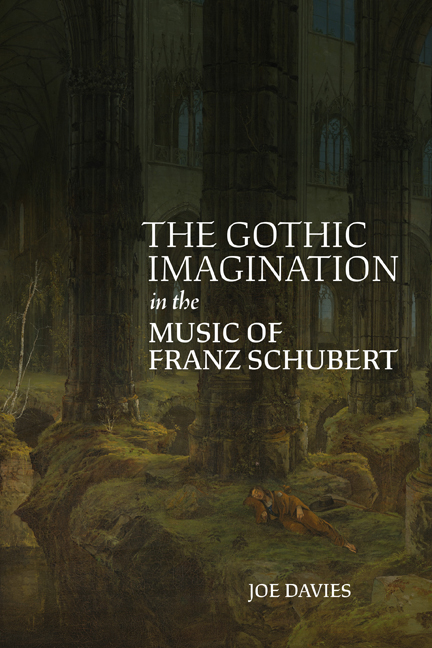Summary
The ‘strange procedures’ of Schubert's creativity that the publisher detected in 1826, or the critic's mention of ‘bizarre, grotesque things’ in his early songs, quoted in the Introduction and chapter 1, re-emerge through this book as part of the lexicon of gothic necropoetics that captivated the imagination of the time. Strangeness, whether through sonic signifiers or poetic subject matter, weaves its way in and out of the case studies. Pieces that reflect the dreamworlds of ‘Nacht und Träume’, such as the Adagio of the String Quintet, give way to extreme disjuncture characteristic of the grotesque. Funereal music undergoes doubling and distortion, as in the Andante of the Piano Trio in E flat and the C minor Impromptu, discussed in chapter 2. And music that is eerie one moment turns sublime in another, as suggested in relation to the dialectics of pain and pleasure in ‘Bertas Lied in der Nacht’ and ‘Der Unglückliche’, in chapter 3. The recurrence of tropes (musical and poetic) highlights the fluidity of a vocabulary that is doubled, warped, defamiliarized, and left unreconciled across generic and chronological boundaries.
Prominent amid this continuity of gothic tropes are the ways in which their associations, and the contexts in which they appear, change over time. One such example is the octave doubling present in much of the music discussed here, from the opening stanzas of ‘Leichenfantasie’, the first case study of chapter 1, to the return of split lefthand octaves in the opening of the Andantino of the A major Piano Sonata, D 959, the final case study of chapter 4. Their recurrence suggests implicit dialogues across the case studies, with blurred boundaries among the contrasting iterations: the latter example, while devoid of the supernatural associations of the former, carries traces of death through its distant echoes of the earlier songs, and is now tinged with the weight of what has come before. Musical material undergoes change, returning in altered contexts, as highlighted by the fusions of funereal and French overture style, or the ways in which themes are distorted in the C minor Impromptu and the Adagio of the E flat Trio. Funereal imagery, as in the wider range of case studies in chapter 2, is devoid of its connotations in Schubert's graveyard settings, while containing echoes of their soundworlds.
- Type
- Chapter
- Information
- The Gothic Imagination in the Music of Franz Schubert , pp. 151 - 156Publisher: Boydell & BrewerPrint publication year: 2024



